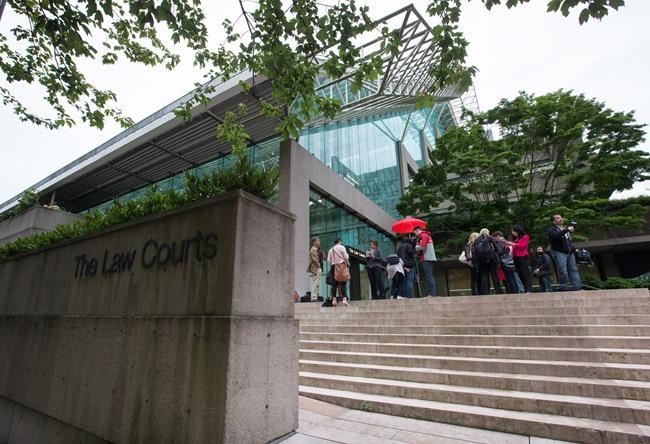
Media wait outside B.C. Supreme Court, in Vancouver, B.C., on Tuesday June 2, 2015. THE CANADIAN PRESS/Darryl Dyck
Republished November 14, 2022 - 4:46 PM
Original Publication Date November 14, 2022 - 12:26 PM
VANCOUVER - Two men accused of killing a man the day after escaping a minimum-security federal prison on Vancouver Island pleaded not guilty to first-degree murder as their trial got underway in British Columbia Supreme Court on Monday.
Zachary Armitage and James Lee Busch are charged with killing 60-year-old Martin Payne in July 2019, a day after the pair walked away from William Head Institution, located about eight kilometres from the victim's home in Metchosin.
Justice David Crossin told the jury at the start of the trial that although the men are being tried together, their guilt or innocence should be determined individually.
A witness later testified she received a call from Armitage on the day of the killing that the Crown said came from the landline in Payne's home.
Crown prosecutor Sofia Bakken said Payne was killed in his home after returning from his job as a mail carrier in Victoria the day after the two men escaped.
The court heard Armitage and Busch escaped the institution located on a small peninsula west of Victoria by walking along the shoreline at low tide.
Bakken outlined some of the evidence and the witnesses the jury is set to hear from in support of the Crown's theory that Armitage and Busch killed Payne to further their escape, including a forensic specialist expected to testify about finding three identifiable DNA profiles in the victim's home: his own, and those of the accused.
DNA matching Armitage's was also identified on the butt of a cigarette found in Payne's truck, she said.
Another expert is set to testify about activity on Payne's computer after he had left home for work, including internet searches for news articles related to escaped prisoners from William Head Institution, the phrase "private water taxi" and the name "Zachary Armitage," Bakken told the court.
The recording of a phone call from the landline in Payne's home to a water taxi service will be played in court later in the trial, she said, and an officer who worked at the prison is expected to testify about recognizing Armitage's voice.
The Crown's first witness was a woman who testified that she and Armitage met while he was incarcerated at Mission Institution in B.C.'s Fraser Valley around 2014, and they later fell in love.
She said he called her on the morning of July 8, 2019, the day Payne would later be killed.
That call came from the landline in Payne's home, the Crown said.
There was a "significant" amount of blood in Payne's home, Bakken said, and a pathologist is also expected to testify about identifying "chop wounds" to the victim's skull that were consistent with those inflicted by a hatchet.
The prosecutor said Armitage and Busch were arrested after they approached a man walking a dog who happened to be an off-duty police officer.
At that point, she said, Payne's body had not yet been found. Officers found the victim on the floor of his bathroom three days after he was killed, Bakken said.
The Crown's second witness was Jeffrey Cashin, who testified that he worked at William Head Institution for close to 30 years before retiring, and he had been involved in searching for Armitage and Busch after their escape.
Under cross-examination by Armitage's defence lawyer, James Heller, Cashin agreed that inmates had to earn some measure of trust in order to end up at the institution. He said they live in clusters of duplexes to which they are not confined during the day, and they participate in various work or rehabilitation activities.
Security measures include alarms that are activated on the duplex doors every night at 10 p.m., checks and counts throughout the day to ensure all inmates are accounted for, and cameras on the institution's property, Cashin told the court.
Cashin testified he reviewed security footage showing Busch and Armitage walking around the institution's fence line around the time of their escape.
Heller asked if the men had weapons with them, and Cashin said he didn't know.
Armitage's lawyer suggested Busch may have had a hatchet, possibly taken from an Indigenous-focused program at the institution, and Cashin repeated that he couldn't say, and he wasn't aware of such a weapon being taken from William Head.
Crossin explained to the 12 members of the jury that they must be sure of each man's guilt beyond a reasonable doubt if they are to deliver guilty verdicts.
Sitting on the other side of a glass barrier in front of the victim's family members, Busch wore a grey sport jacket and collared shirt with a short, slicked-back ponytail, while Armitage had a buzz cut and wore a T-shirt layered over a long-sleeved shirt.
Both men appeared to take notes throughout the hearing.
The trial is scheduled to last five weeks.
This report by The Canadian Press was first published Nov. 14, 2022.
News from © The Canadian Press, 2022